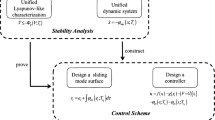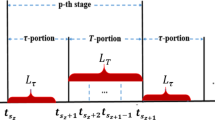Abstract
Based on some practical engineering problems arising from process control and space-structure control, this paper studies a class of hybrid dynamic systems in which N plants are controlled by a central controller in sharing time manner, where the plants are described by differential equations and the controller works according to the mechanism of discrete events. An event feedback strategy is suggested to be a scheduling policy such that one and only one plant among N plants is chosen to be controlled at any time. Some conditions of asymptotical and exponential stability are then given and an exponential upper bound of states norm is also estimated for the event feedback scheduling strategy. An algorithm based on event feedback strategy is presented to determine the control laws of the plants to meet the given performance. An example follows to illustrate the application and effect of the results.
Similar content being viewed by others
References
Baz, A. and Hong, J. 1997. Adaptive control of flexible structures using modal positive position feedback. International Journal of Adaptive Control and Signal Processing 11: 231–253.
Benveniste, A. and Guernic, P. L. 1990. Hybrid dynamic systems theory and the SIGNAL language. IEEE Trans. Automat. Contr. 35: 535–546.
Caines, P.E. and Wei, Y. 1998. Hierarchical hybrid control systems: a lattice theoretic formulation. IEEE Trans. Automat. Contr. to appear.
Chase, C., Serrano, J. and Ramadge, P. J. 1993. Periodicity and chaos from switched flow systems: contrasting examples of discretely controlled continuous systems. IEEE Trans. Automat. Contr. 38: 70–83.
Harte, G. S. 1991. Multiplexed I/O yields a variety of control options. INTEC. October, pp. 30-32.
Kohn, W., Nerode, A., Remmel, J. B. and Yakhnis, A. 1995. Viability in hybrid systems. Theoretical Computer Science 138: 141–168.
Peleties, P. and Decarlo, R. A. 1991. Analysis of a hybrid system using symbolic dynamics and Petri nets. Automatica 30: 1421–1427.
Peleties, P. and Decarlo, R. A. 1993. A modeling strategy for hybrid systems based on event structures. Discrete Event Dynamic Systems: Theory and Applications 3: 39–69.
Perkins, J. R. and Kumar, P. R. 1989. Stable, distributed, real-time scheduling of flexible manufacturing/assembly/ disassembly systems. IEEE Trans. Automat. Contr. 34: 139–148.
Perkins, J. R., Humes, C. Jr. and Kumar, P. R. 1994. Distributing scheduling of flexible manufacturing systems: stability and performance. IEEE Trans. Robotics and Automation 10: 133–141.
Pettersson, S. and Lennartson, B. 1996. Stability and robustness for hybrid systems. Proceedings of the 35th Conference on Decision and Control. pp. 1202–1207.
Ye, H., Michel, A. N. and Hou, L. 1995. Stability theory for hybrid dynamical systems. Proceedings of the 34th Conference on Decision and Control. pp. 2679–2684.
Author information
Authors and Affiliations
Rights and permissions
About this article
Cite this article
Zhao, Q.C., Zheng, D.Z. Stable and Real-Time Scheduling of a Class of Hybrid Dynamic Systems. Discrete Event Dynamic Systems 9, 45–64 (1999). https://doi.org/10.1023/A:1008320614629
Issue Date:
DOI: https://doi.org/10.1023/A:1008320614629




